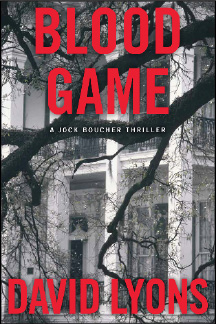BLOOD GAME R. D. LYONS PROLOGUE
Those who forget history are doomed to repeat it.”
George Santayana (1863-1952)
PROLOGUE
Mac Halley deserved a better death.
He’d known failure, more than his share. Three marriages had ended in bitter divorce. Failed husband. Three kids from those marriages were grown and on their own. Not one kept in touch with him. Failed father. He had owned a small barge company that plied the Mississippi River and inter-coastal waterways of Louisiana but it went bust. Then he had a seafood restaurant overlooking the gulf, but Katrina smashed it flat and when he’d spent his every last dime getting it back on its feet, the oil spill fouled the neighborhood beaches and robbed him of the regular trade he had built up. Failed businessman. Alicia, his latest live-in had dumped him; walked out with her suitcase—and his Rolex. Failed lover. At fifty-five years of age he didn’t have much left, but it helped when he gave himself credit for his one consistent success in life, survival. His failures were not all his fault and the fact that he got back on his feet over and over reinforced his sense of self-worth. His resilience had helped him land the job he had now; a shit job but one that kept him alive. Halley’s present occupation was a galley cook on one of the many offshore service vessels owned by Dumont Industries, one of the Gulf Coast’s biggest conglomerates. It was a curious combination of his former lines of work, only now he was a grunt, not a proprietor. Big difference.
The 350 foot high-capacity vessel had finished a run deep into the gulf and was now on its way back to shore. It had been his first trip. Except for sack time in his bunk, he’d spent all his time in the galley cooking, as he’d expected. What he hadn’t expected was to be ordered to remain in the galley unless permission was given to go topside. This ship was not running personnel to and from the offshore rigs, as most of them did, but taking out drilling equipment. Were they worried he’d hurt himself? He probably knew the business better than most of the crew.
On the second day of rolling seas, he said to hell with the orders. He needed some air. Looking for an access to the main deck he passed an entrance to the ship’s hold, opened the door, and took a peek. He wasn’t sure what he saw, but he knew what it wasn’t. It wasn’t offshore drilling equipment. One item was uncovered. It was a tripod and stood chest-high. Painted olive drab. Halley forgot about going on deck. He hastened back to the galley. Where he stayed the rest of the day.
That night he was in his bunk alone. All the crewmates quartered with him were on duty. The ship was slowing down and, without speed, was rolling in moderate swells. Being cooped up inside was enough to make any sailor seasick. He got up, went to the head, and splashed cold water from the sink on his face. He then went to the cabin door and found it locked. They’d locked him in the crew’s quarters. The engines rumbled, gurgled, then stopped. He heard another ship for just a moment, then its engines died too. It was close by. Then it was alongside. There wasn’t a lot of noise, but he knew his ship’s cargo was being transferred. The silence was odd. He’d never offloaded a ship without yelling orders. It was part of the process. When he finally did hear voices, they were speaking Spanish. Half an hour later, the engines started up. Halley got back in his bunk. He feigned sleep when his mates returned.
The next day, he waited for his chance and took another peek at the hold. There was a new cargo. The hundreds of rectangular packages were easily identifiable. That night after dinner, he complained about the restriction on his movement. A man needs fresh air.
“Go on up,” the captain said. “Have a smoke.”
He was standing at the stern of the vessel, one hand on the railing. It was a still night with a half-moon and, by its light he gazed at the dark water, phosphorous blinking like fireflies. He took a drag from his cigarette, leaned over the rail, and exhaled smoke. He did not know what sent him over and into the ship’s wake. His head hit the stern as he fell, and Halley was unconscious when he hit the water. Reflex actions took over, his pulmonary system seeking air. Half a liter of water was swallowed with the first gasp and flooded into his lungs. Then six liters of ocean water filled his respiratory organs. His throat constricted with rigor, cutting oxygen to his brain. Survival, his one success in life, now eluded him.
The body sank quickly; fifty feet, one hundred, till it danced on underwater currents. Inside the cadaver, nature’s forces began their slow but inexorable process. Bacteria feeding on dead flesh in the belly and chest began to produce gas, carbon dioxide, hydrogen sulfide, methane, gases that caused it to rise like a balloon, though not all body parts rose at the same time. The torso was the first to bloat, as it contained more bacteria than the head, arms, and legs. The body was turned facedown in the water, limbs dragging below and behind. Passing fish took their nibbles. About a week later, the bloated corpse of Mac Halley rose to the surface. It wasn’t pretty. He had deserved a better death. He’d worked hard for it all his life.
